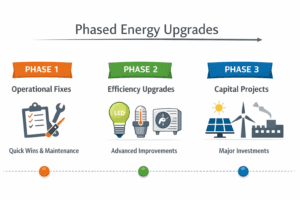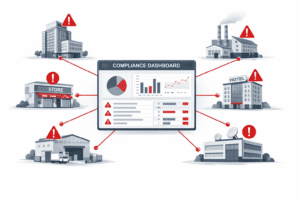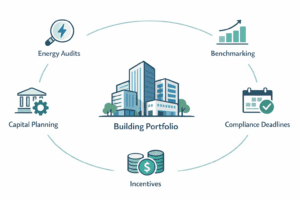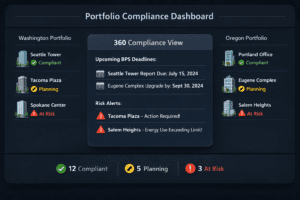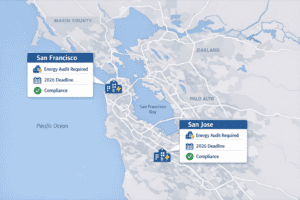As the saying goes, “Forewarned is forearmed.” This is particularly true when it comes to navigating the complexities of modern benchmarking laws. Businesses and organizations are increasingly required to report their energy and resource usage in great detail, which has been driven by a global push towards sustainability and accountability. The challenge of maintaining compliance can be daunting but integrating Artificial Intelligence (AI) into the process can make it significantly easier to manage. This blog post will explore how AI is becoming an indispensable tool for avoiding the penalties associated with non-compliance under new benchmarking regulations.
I. Introduction

Benchmarking laws have recently undergone significant revisions, with many jurisdictions introducing stricter norms to combat climate change and promote energy conservation. For instance, New York City’s Local Law 97 requires buildings over 25,000 square feet to meet new carbon emission standards by 2024, or face penalties. Adapting to these changes isn’t just a matter of legal compliance; it’s also about embracing social responsibility and sustainable business practices.
Within this context, AI is quickly becoming an invaluable asset. It can analyze vast datasets, identify patterns, and make predictions with a level of speed and accuracy that humans cannot match. The capacity of AI for automation and its predictive analytics can be instrumental in ensuring that organizations align with benchmarking laws while optimizing their energy usage.
II. Understanding New Benchmarking Laws
Benchmarking laws come in different shapes and sizes, depending on the jurisdiction, but they generally share a common goal: to reduce energy consumption and greenhouse gas emissions. These laws typically require the regular submission of detailed energy and water usage information, which is then compared against a set of standards or against the performance of similar entities.
For example, the EU’s Energy Efficiency Directive (EED) mandates that member states set up an energy consumption monitoring framework. The collected data must be made public, thereby promoting transparency and encouraging improvements.
Non-compliance can spell disaster, with fines that can escalate quickly and negatively impact an organization’s market standing and stakeholder trust. This underscores the crucial need for precise and continuous adherence to these evolving standards.
III. The Role of AI in Compliance
AI can sift through dense legal texts and energy consumption data to identify relevant compliance metrics, offering a comprehensive overview of an organization’s regulatory landscape. This ranges from straightforward tasks like data collection and analysis to more complex ones, such as predictive compliance.
One of the most significant advantages of AI in this realm is its adaptability. As benchmarking laws change, AI systems can be updated to include new parameters or standards, ensuring that organizations stay on top of their compliance obligations. Additionally, AI can integrate with energy management systems to provide real-time analytics, allowing for immediate adjustments to improve efficiency and compliance.
IV. AI Tools for Benchmarking Law Compliance
Numerous AI-powered tools have emerged to assist with compliance benchmarking. For instance, platforms like ENERGY STAR Portfolio Manager (ENERGY STAR)) help manage energy and water consumption in line with federal benchmarks.
These tools work by aggregating data from various sources, normalizing it to account for factors like weather or operational changes, and providing insights into energy consumption patterns. As a result, they can offer tailor-made recommendations for energy savings and facilitate the creation of compliance reports with greater accuracy.
However, while AI tools can significantly enhance benchmarking law compliance, they do come with considerations. The initial cost of implementation, the need for staff training, and the integration with current systems are challenges that must be carefully weighed.
V. Utilizing AI for Automated Compliance Checking
Automated compliance checking via AI means continuous monitoring and analysis of energy consumption data. It facilitates the early detection of anomalies or consumption spikes, which can then be addressed before they lead to non-compliance.
This automation offers several benefits, including the reduction of manual errors and the freeing of human resources for tasks that require nuanced judgment. Moreover, automated compliance checks can serve as a constant audit trail, providing transparency and facilitating easier reporting to regulatory bodies.
VI. Future Possibilities of AI in Legal Compliance

Looking ahead, AI’s predictive capabilities will likely become even more powerful. For instance, integrating AI with the Internet of Things (IoT) could enable real-time energy consumption monitoring, leading to immediate adjustments that save energy and ensure compliance.
Nevertheless, the expanded use of AI is not without its concerns. Ensuring data privacy, understanding algorithmic decisions, and avoiding biased outcomes are challenges that we must address as AI systems become more autonomous. Additionally, ethical considerations related to AI decision-making in legal contexts will become increasingly significant and will require careful deliberation (Ethics of AI).
VII. Conclusion
AI has the potential to be a transformative force for organizations seeking to comply with the latest benchmarking laws. By automating and optimizing compliance processes, AI can help avoid costly penalties and promote a culture of sustainability.
Businesses and property owners should seriously consider adopting AI tools to manage their energy benchmarking requirements. At the same time, there is a critical need for ongoing awareness and education concerning the effective and ethical use of AI in compliance strategies.
By staying informed and proactive, we can harness the power of AI to navigate the complexities of benchmarking laws while contributing to a more sustainable future. The integration of AI into compliance efforts is not just a smart move; it’s an essential step forward in the age of digital transformation and environmental stewardship.
VertPro.com serves as a resourceful platform for property owners and managers seeking to enhance their buildings’ energy efficiency. The site offers a range of services, including Commercial Energy Audits, Benchmark Compliance consultancy, and a Construction Marketplace. At the heart of VertPro® is a suite of SaaS technology-based solutions designed to assist in navigating the complexities of Energy Benchmarking and Energy Audits/RCx Plus, while ensuring adherence to over 60 Energy Benchmarking and Energy Efficiency Laws across the country.
For those looking to improve their property’s energy usage and operational value, VertPro.com provides a diverse array of tools and information. The site aims to facilitate a better understanding of energy efficiency practices and legislation, helping building owners and property managers make informed decisions about their energy strategies while complying with all energy ordinances and laws.



